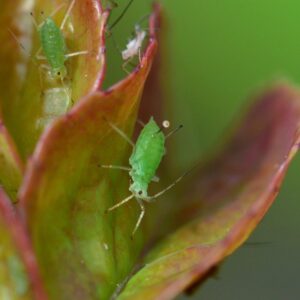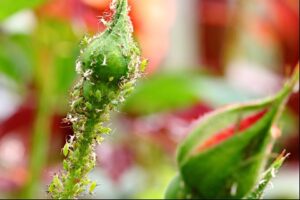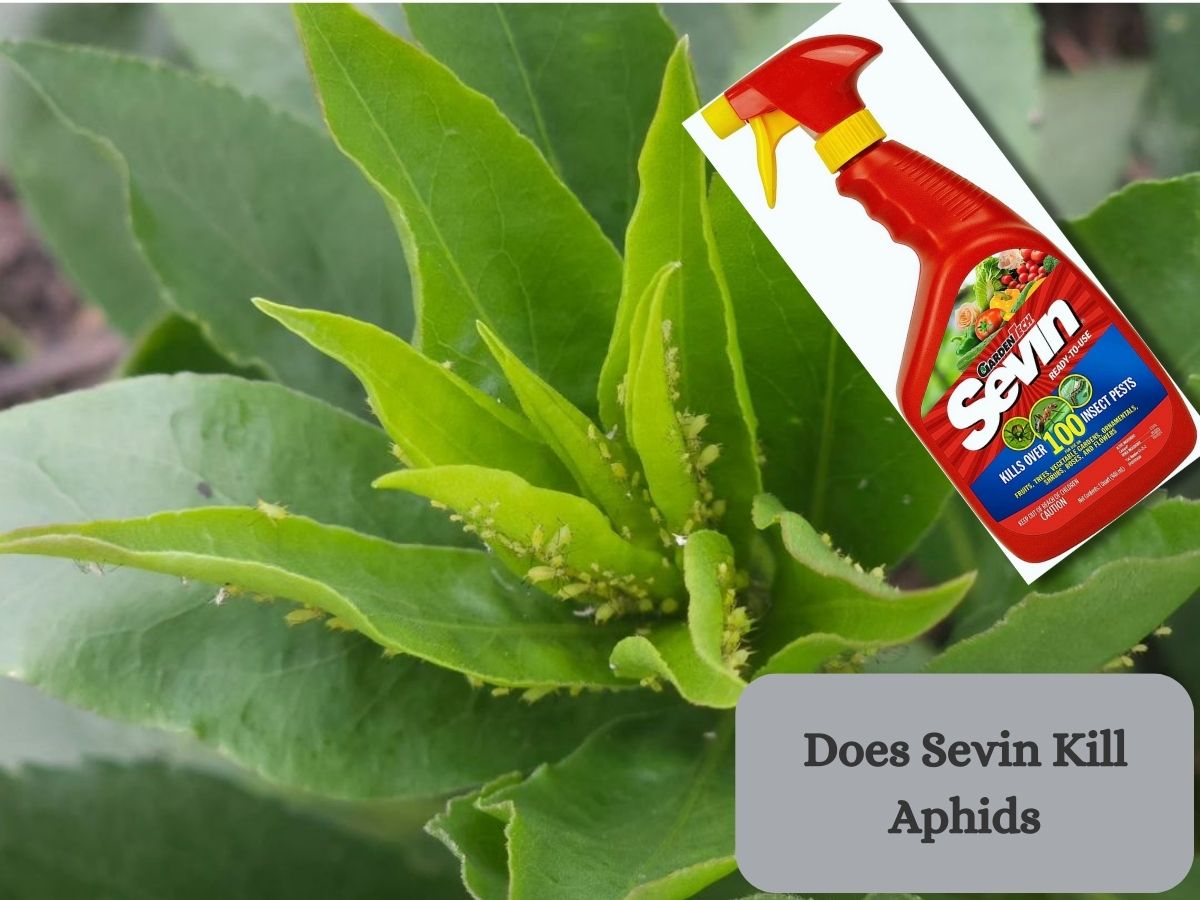If you’re an avid gardener like me, you know how distressing it can be to find your plants under attack by those pesky aphids. Fear not, fellow green thumbs, for we have a garden superhero on our side—Sevin insecticide! In this article, we’ll dive into the world of aphids and explore whether Sevin lives up to its reputation as an aphid annihilator.
Aphids, those tiny vampires of the plant kingdom, may be small, but boy, can they wreak havoc! They swarm our beloved plants, sucking the life out of them with their voracious appetite for sap. The damage they inflict weakens plant structures and leaves them susceptible to diseases. But fear not, for we have Sevin—the ultimate guardian against these menacing aphids.
Sevin has been hailed as a mighty insecticide, a beacon of hope for gardeners battling with pests. Its reputation precedes it, making it a staple in gardens far and wide. But the question that lingers in every gardener’s mind is this: Does Sevin truly have what it takes to eradicate aphids and restore peace to our lush green havens?
Well, dear gardeners, the answer is a resounding YES! Sevin has been proven time and again to be a formidable foe for aphids. With its potent active ingredients and efficient mode of action, Sevin sends aphids packing, leaving our plants to flourish once more.
So, let’s embark on this aphid-slaying adventure together as we uncover the truth about Sevin’s aphid-killing prowess. Prepare to be amazed and armed with the knowledge to safeguard your garden like never before. Let’s banish those aphids and welcome back the beauty of our thriving plants with Sevin by our side.
Understanding Aphids and Their Damage
The notorious aphids; tiny but mighty in their appetite for destruction. These miniature marauders can quickly wreak havoc on your once-thriving garden if left unchecked. But fear not, dear gardener, for knowledge is power, and understanding their ways can help you protect your green paradise.
Signs of Aphid Infestation
Detecting an aphid infestation early on is crucial to prevent them from multiplying into a full-blown invasion. Keep a keen eye out for these telltale signs:
- Misshapen Leaves: Aphids love to feast on tender young leaves, causing them to curl, pucker, or become distorted.
- Sticky Residue: Known as “honeydew,” aphids excrete a sweet, sticky substance that attracts ants and promotes the growth of black sooty mold on leaves.
- Yellowing Leaves: As aphids drain the sap from your plants, leaves may turn yellow and eventually drop prematurely.
- Tiny Crawlers: Aphids come in various colors, like green, black, brown, or even pink, and you might spot them clustered on the undersides of leaves or stems.

Potential Damage Aphids Can Cause
Don’t be fooled by their minuscule size; aphids can cause significant harm to your beloved plants:
- Stunted Growth: Aphids siphon essential nutrients from plant sap, hindering proper growth and development.
- Spread of Diseases: These sap-sucking intruders can transmit viruses and bacteria between plants, leading to further complications.
- Fruit and Flower Damage: Infestations can mar the beauty of your blooms and deform your fruits, rendering them unappealing and less nutritious.
- Weakened Plants: As aphids continue to feed, they weaken your plants, leaving them more susceptible to other pests and environmental stressors.
Now that we’ve unraveled the mischief of these aphid invaders, it’s time to take action! Let’s explore how Sevin, your garden’s ultimate guardian, steps up to the challenge and restores harmony to your green haven.
Does Sevin Kill Aphids?
When it comes to battling aphids, Sevin stands as a formidable contender, renowned for its prowess in pest control across gardens far and wide. Let’s dive into the scientific evidence and real-life experiences that unveil the truth about Sevin’s effectiveness in squashing those sap-sucking nuisances.
Sevin has long been a staple in gardeners’ arsenals, earning its reputation as a reliable and effective insecticide. Available in various formulations, including liquid sprays and trusty Sevin dust, this versatile warrior targets a wide range of pests, including notorious aphids, slugs, and bugs. Its popularity is well-earned, thanks to its ease of use and impressive results.
The magic behind Sevin’s success lies in its active ingredients, the most prominent being carbaryl. Once applied, carbaryl takes center stage, launching a full-scale assault on aphids and other garden intruders.
It disrupts their nervous system, causing chaos within their tiny ranks and ultimately leading to their untimely demise. Sevin takes no prisoners when it comes to safeguarding your precious plants.
But let’s not just rely on laboratory results; the best proof comes from fellow gardeners who have stood face-to-face with aphid invasions and emerged victorious with Sevin by their side.
Replete with positive testimonials, gardeners worldwide praise Sevin for its ability to reclaim their once-besieged gardens. From backyard enthusiasts to seasoned horticulturists, the consensus is clear; Sevin gets the job done.

How to Use Sevin Against Aphids
Now that we’ve established Sevin as your trusty aphid-slaying sidekick, let’s equip you with the knowledge to wield its powers effectively.
With these step-by-step instructions and expert tips, you’ll be well-prepared to take on those aphid invaders and reclaim your garden with confidence.
Step-by-Step Guide to Applying Sevin Insecticide:
- Identify the Infested Areas: Take a thorough stroll through your garden and identify the areas affected by aphids. Focus on new growth, flower buds, and the undersides of leaves where these pesky critters tend to congregate.
- Choose the Right Formulation: Select the Sevin formulation that best suits your needs—liquid sprays for broad coverage or Sevin dust for targeted applications. Ensure you have the appropriate safety gear, such as gloves and a mask, to protect yourself during the process.
- Read the Label Instructions: Before you begin, read and follow the instructions on the Sevin product label diligently. This step is vital to ensure safe and effective application.
- Prepare the Solution: If you’re using liquid Sevin, mix the recommended amount of insecticide with water in a sprayer, following the label’s instructions for dilution ratios. For Sevin dust, there’s no mixing required—just open the container and prepare to dust away!
- Application Technique: For liquid Sevin, evenly spray the infested areas, ensuring complete coverage of both the upper and lower surfaces of the leaves. When using Sevin dust, gently dust the foliage and stems of affected plants. Be thorough but avoid excessive application.
- Time it Right: The best time to apply Sevin is during early morning or late evening when aphids are most active and temperatures are milder. Avoid treating plants in direct sunlight or windy conditions, as this can lead to ineffective application or unintended drift.
- Observe and Reapply if Necessary: Keep a close eye on your plants after applying Sevin. If you notice persistent aphid activity or a resurgence in their numbers, consider reapplying Sevin after a few days, adhering to the reapplication guidelines on the product label.
Tips and Best Practices for Sevin Application:
- Safety First: Always wear the appropriate safety gear when handling Sevin, such as gloves, protective clothing, and a mask, to minimize contact with the insecticide.
- Avoid Beneficial Insects: Although Sevin targets pests like aphids, it’s essential to avoid spraying beneficial insects like bees and ladybugs directly. Opt for spot treatments instead of blanket spraying.
- Store and Dispose Properly: Store Sevin in a cool, dry place, away from children and pets. Dispose of any unused products and empty containers responsibly according to local regulations.
- Combination with Other Methods: For severe aphid infestations, consider using Sevin in conjunction with other pest control methods, like natural predators, to achieve the best results.
With this knowledge in hand, you’re well-equipped to utilize Sevin’s aphid-fighting capabilities to the fullest. So gear up, step into your garden, and let Sevin do what it does best; protect your plants from aphid mayhem, restoring harmony and beauty to your green sanctuary.

Does Sevin dust kill aphids Also?
Absolutely! Sevin dust is an effective weapon in the battle against aphids. It contains the same active ingredient, carbaryl, as liquid Sevin, and when applied correctly, it can swiftly eliminate aphids infesting your plants.
Sevin dust is especially useful for targeting specific areas of infestation, as you can gently apply it directly to the affected leaves and stems. This targeted approach ensures that the aphids come into direct contact with the insecticide, allowing it to work its magic on their nervous system and effectively exterminate them.
Like any pesticide, it’s essential to follow the label instructions carefully when using Sevin dust. Wear the appropriate safety gear, avoid excessive application, and be mindful of beneficial insects like bees and ladybugs that might visit your plants. With proper application and adherence to safety guidelines, Sevin dust can be a potent and reliable tool in your arsenal to combat aphids and protect your garden’s greenery from their appetite for destruction.

Safety Considerations
Before diving into the battlefield against aphids with Sevin, it’s vital to remember that all pesticides, including Sevin, demand respect and caution.
Your safety and the well-being of your loved ones, pets, and the environment should always be a top priority. Here’s why it’s crucial to follow safety guidelines when dealing with any pesticide:
- Protecting Yourself: Pesticides, including Sevin, contain active chemicals that can be harmful if mishandled. Adhering to safety guidelines minimizes your risk of exposure and potential health hazards.
- Preserving the Environment: Proper use and disposal of pesticides help prevent harmful chemicals from contaminating soil, waterways, and beneficial insects, ensuring a healthier ecosystem.
- Targeting the Pest: Following label instructions ensures you use the pesticide correctly, enhancing its effectiveness in combating pests like aphids while minimizing unintended harm to non-target organisms.
Precautions and Safety Measures for Handling Sevin:
- Read the Label Thoroughly: The product label is your ultimate guide to using Sevin safely and effectively. Before each use, read and follow the instructions provided by the manufacturer.
- Wear Appropriate Safety Gear: When handling Sevin, wear gloves, long-sleeved clothing, long pants, closed-toe shoes, and a dust mask to protect your skin and respiratory system from potential contact with the insecticide.
- Keep Children and Pets Away: Ensure children and pets are kept away from treated areas until the pesticide has thoroughly dried or as specified on the product label.
- Avoid Direct Contact: Minimize direct contact with Sevin. If contact occurs, wash the affected area thoroughly with soap and water.
- Proper Storage and Disposal: Store Sevin in its original container, tightly sealed, and in a cool, dry place. Keep it out of reach of children and pets. Dispose of any unused product and empty containers according to local regulations.
- Application Safety: Apply Sevin during calm weather to prevent the insecticide from drifting. Avoid spraying on windy days or when rain is expected within 24 hours.
- Avoid Food Contamination: Prevent cross-contamination by avoiding the use of Sevin-contaminated equipment or clothing near food preparation or consumption areas.
Remember, responsible pesticide use ensures a healthier and safer gardening experience. By being diligent in following safety guidelines, you can confidently wield Sevin’s aphid-killing powers without compromising your well-being or the environment. Safeguard your garden, protect yourself, and let Sevin help you restore balance and beauty to your green sanctuary.
Other Methods for Controlling Aphids
While Sevin is a potent ally in the fight against aphids, some gardeners prefer natural and organic approaches to pest control. Embracing eco-friendly methods not only preserves the environment but also promotes a healthier balance in your garden. Here are some effective alternative methods to help you keep aphids at bay:
- Neem Oil: Neem oil is a powerful natural insecticide derived from the neem tree. It disrupts aphids’ feeding and reproductive systems, deterring their presence on your plants. Dilute neem oil as per the instructions on the product label and apply it to the affected areas.
- Insecticidal Soap: Insecticidal soap is a gentle yet effective solution for aphid control. It works by suffocating and dehydrating aphids, ultimately leading to their demise. Spray the insecticidal soap on aphids, ensuring good coverage of the pests.
- Ladybugs and Lacewings: Invite nature’s pest control agents to your garden. Ladybugs and lacewings are voracious aphid predators, capable of devouring hundreds of aphids daily. Release these beneficial insects into your garden to feast on the aphid invaders.
- Attract Birds: Attracting birds to your garden creates a natural aphid control system. Birds, especially chickadees, titmice, and sparrows, relish aphids as a tasty snack. Plant native trees and shrubs, provide bird feeders, and create a bird-friendly environment to entice these feathered allies.
- Pruning and Trimming: Regularly prune and trim affected plant parts to remove heavily infested areas. Dispose of the pruned material away from the garden to prevent reinfestation.
- Water Blast: Use a strong jet of water from a hose to dislodge aphids from your plants. This simple technique physically removes the pests without harming beneficial insects or plants.
- Beneficial Nematodes: Beneficial nematodes are microscopic worms that feed on aphid larvae in the soil. Apply nematodes to the affected areas as a soil drench to reduce aphid populations.
- Companion Planting: Interplanting certain plants with your garden crops can deter aphids. For example, garlic, chives, and marigolds emit odors that aphids dislike, acting as a natural repellent.
By incorporating these natural and organic methods into your aphid control strategy, you create a harmonious and eco-friendly garden environment.
A combination of these methods with Sevin, if necessary, can ensure a well-rounded approach to managing aphids and nurturing the health of your cherished plants.
Choose the methods that resonate with your gardening philosophy and let nature’s wisdom guide you in fostering a thriving and balanced garden ecosystem.

Does Sevin kill aphids FAQs?
Can Sevin be used on all types of plants?
Sevin is a versatile insecticide suitable for use on a wide range of plants, including ornamentals, fruits, vegetables, and more. Its efficacy extends to various plant species, making it a popular choice for gardeners dealing with diverse aphid challenges.
However, as with any pesticide, it’s essential to read the product label carefully to ensure that Sevin is safe for the specific plants you intend to treat. Some sensitive plants may have specific restrictions or require different formulations of Sevin, so always check the label for plant-specific instructions.
Is Sevin safe for pets and beneficial insects?
While Sevin is potent against pests like aphids, it can also pose a risk to non-target organisms, including pets and beneficial insects like bees and ladybugs. As a responsible gardener, it’s crucial to exercise caution when using Sevin to minimize harm to these beneficial creatures. Avoid direct contact with pets and beneficial insects during and after application.
To protect bees and other pollinators, refrain from spraying Sevin on flowering plants when they are in bloom, as bees may visit these flowers. Instead, opt for spot treatments to minimize exposure. Always follow the label instructions, and when in doubt, consult with a local horticulturist or an expert to ensure the safety of your garden’s inhabitants.
How quickly does Sevin eliminate aphids?
The speed at which Sevin eliminates aphids can vary depending on several factors, including the severity of the infestation, weather conditions, and the aphid species. In general, you can expect to see a decline in aphid activity within a few days after application.
However, it’s essential to be patient, as some aphids may take longer to succumb to the effects of Sevin. For severe infestations, it may require additional applications, as outlined on the product label, to achieve satisfactory results.
Are there any potential side effects of using Sevin in the garden?
Using Sevin in the garden can be highly effective in controlling aphids and other pests, but it’s essential to be aware of potential side effects. Overuse or improper application of Sevin may lead to unintended harm to non-target organisms, soil health, and the environment.
Additionally, some plants may exhibit phytotoxic reactions to Sevin if applied incorrectly or during adverse weather conditions. To minimize potential side effects, always follow the product label instructions precisely, use Sevin only as necessary, and implement integrated pest management practices to maintain a healthy garden ecosystem.
Conclusion
The battle against aphids finds a powerful ally in Sevin, the trusted garden insecticide. With its active ingredient, carbaryl, Sevin proves to be a formidable foe for these sap-sucking invaders, effectively curbing their damage and restoring harmony to your beloved garden.
Our journey through the world of aphids and Sevin has unveiled the truth; Sevin does indeed kill aphids, and its reputation as a reliable pest control solution is well-deserved. Supported by scientific studies and the experiences of fellow gardeners, Sevin stands as a potent weapon in the fight against aphid infestations.
However, as we tread this path of garden guardianship, we must also be mindful of safety and environmental considerations. Following safety guidelines and exploring eco-friendly alternatives, like neem oil, insecticidal soap, and beneficial insects, allows us to strike a balance between effective pest control and preserving the delicate ecosystem of our gardens.
In the end, the choice is yours; Sevin offers a robust and efficient solution, while alternative methods embrace nature’s wisdom. Armed with knowledge and care, you can confidently protect your plants and foster a thriving garden, abundant with life and beauty. Embrace the power of Sevin or embrace nature’s embrace itself, and may your garden flourish with joy and resilience. Happy gardening!
